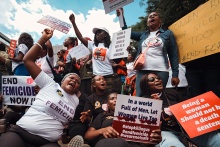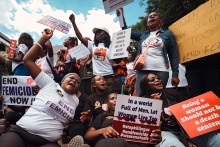On 27 January, thousands of women and men marched in Nairobi and other major cities in Kenya calling for an end to femicide and violence against women. Protesters carried placards with messages including “We Are Human Beings”, “Say Their Names”, and “Stop Killing Us!”
Femicide cases in Kenya fuel urgent calls for action to end violence against women
At least 500 women and girls have been murdered in Kenya since 2016, despite the country’s efforts to prevent gender-based violence, according to the Africa Data Hub, a regional network of data organizations that traces such killings based on newspaper reports.
The organization wrote that its data is likely not inclusive of all the femicides during that period, and said, “the cases are not isolated; instead, they reveal recurring patterns, indicating a deeper and more systemic issue.”
According to a report from the United Nations Office on Drugs and Crime and UN Women, current and former intimate partners are the most likely perpetrators of femicide, accounting for an average of 55 per cent of all intimate partner and family related killings.
“The shocking reality that at least 10 women have been killed in the first month of 2024 alone intensifies an already troubling trend”, said Mary Njeri, a gender-based violence analyst at UN Women. “Each loss is a stark indicator of the systemic issues we are striving to dismantle.”
Such homicides are usually the fatal endpoint of a pattern of physical or sexual violence, fuelled by social norms enforcing male control or power over women, that report said. Throughout Kenya, 41 per cent of women who have been married have experienced physical violence, compared to 20 per cent of those who have not been married.
That process of escalation “underlines the importance of supporting and believing survivors when they speak out”, so further violence can be prevented long before it escalates to murder, said Anna Mutavati, UN Women’s Kenya Representative.
Wangechi Wachira, Executive Director of the Center for Rights Education and Awareness Kenya, agreed.
“We all must ensure that we do not contribute towards the normalization of violence against women and girls and instead work as a nation towards creating an environment where women and girls are safe, protected, and respected,” she said.
UN Women leads several initiatives that aim to prevent femicide and gender-based violence in Kenya, for example by providing specialized training for police personnel. In such programmes, officers are trained to recognize the signs of potential femicide and the unique challenges faced by women, while promoting a victim-centred approach to law enforcement.
UN Women has trained more than 600 officers across Kenya’s National Police Service and National Transport and Safety Authority, as well as members of informal transport sectors.
Separately, UN Women supports survivors of gender-based violence by collaborating with local groups that offer counselling, legal assistance, and access to safe shelters. Through partnerships with five civil society organizations in Kenya, UN Women has facilitated psycho-social support to about 40,000 survivors, and has given legal aid assistance to about 1,000.
The Government of Kenya has committed to ending gender-based violence (GBV) by 2026 as part of its global co-leadership of Generation Equality’s Action Coalition, and Kenya has a robust legal framework surrounding gender-based violence, with myriad laws that—if effectively enforced—could significantly reduce such violence.
“Shockingly, with all the laws, commitments, policies, and promising practices, violence against women and girls remains rampant”, said Mutavati.
“Femicide is the most brutal and extreme manifestation of violence”, she added. “Prevention is our best option against GBV in general but against femicide in particular.”
Mutavati noted that social norms remain a hurdle for preventing femicide in Kenya, and described a need to shift public perceptions.
“We have a lot of work to do to change biased societal perceptions including the media narrative and social media bloggers that fuel the normalization of the killings and victim blaming”, she said. “There is a need for a multifaceted approach targeting social norm change including awareness, education, and efforts to break the silence.”
“All institutions and individuals are targets for these efforts”, she added.

